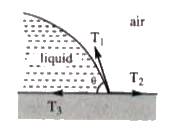Read the given passage and answer the questions that follow :
Surface chemistry deals with the phenomena that occur at the surfaces or interfaces. The interface or surface is represented by separating the bulk phases by a hyphen or a slash. For example, the interface between a solid and a gas may be represented by solid-gas or solid/gas. Due to complete miscibility, there is no interface between the gases. The bulk phases that we come across in surface chemistry may be pure compounds or solutions. The interface is normally a few molecules thick but its area depends on the size of the particles of bulk phases. Many important phenomena, noticeable among these being corrosion, electrode processes, heterogeneous catalysis, dissolution and crystallisation occur at interfaces. The subject of surface chemistry finds many applications in industry, analytical work and daily life situations.
How do you define surface chemistry?
Surface chemistry deals with the phenomena that occur at the surfaces or interfaces.
Topper's Solved these Questions
Similar Questions
(a) 30 g of urea (M = 60 g mol−1) is dissolved in 846 g of water. Calculate the vapour pressure of water for this solution if vapour pressure of pure water at 298 K is 23.8 mmHg. (b) Write two differences between ideal solutions and non-ideal solutions.
View SolutionRead the given passage and answer the questions that follow :
Surface chemistry deals with the phenomena that occur at the surfaces or interfaces. The interface or surface is represented by separating the bulk phases by a hyphen or a slash. For example, the interface between a solid and a gas may be represented by solid-gas or solid/gas. Due to complete miscibility, there is no interface between the gases. The bulk phases that we come across in surface chemistry may be pure compounds or solutions. The interface is normally a few molecules thick but its area depends on the size of the particles of bulk phases. Many important phenomena, noticeable among these being corrosion, electrode processes, heterogeneous catalysis, dissolution and crystallisation occur at interfaces. The subject of surface chemistry finds many applications in industry, analytical work and daily life situations.
Can oxygen/hydrogen form interface ?
View SolutionRead the given passage and answer the questions that follow :
Surface chemistry deals with the phenomena that occur at the surfaces or interfaces. The interface or surface is represented by separating the bulk phases by a hyphen or a slash. For example, the interface between a solid and a gas may be represented by solid-gas or solid/gas. Due to complete miscibility, there is no interface between the gases. The bulk phases that we come across in surface chemistry may be pure compounds or solutions. The interface is normally a few molecules thick but its area depends on the size of the particles of bulk phases. Many important phenomena, noticeable among these being corrosion, electrode processes, heterogeneous catalysis, dissolution and crystallisation occur at interfaces. The subject of surface chemistry finds many applications in industry, analytical work and daily life situations.
What are the dimensions of the interface and its surface area ?
View SolutionRead the given passage and answer the questions that follow : Surface chemistry deals with the phenomena that occur at the surfaces or interfaces. The interface or surface is represented by separating the bulk phases by a hyphen or a slash. For example, the interface between a solid and a gas may be represented by solid-gas or solid/gas. Due to complete miscibility, there is no interface between the gases. The bulk phases that we come across in surface chemistry may be pure compounds or solutions. The interface is normally a few molecules thick but its area depends on the size of the particles of bulk phases. Many important phenomena, noticeable among these being corrosion, electrode processes, heterogeneous catalysis, dissolution and crystallisation occur at interfaces. The subject of surface chemistry finds many applications in industry, analytical work and daily life situations. Which phenomena are studied under surface chemistry ?
View SolutionRead the given passage and answer the questions that follow :
Surface chemistry deals with the phenomena that occur at the surfaces or interfaces. The interface or surface is represented by separating the bulk phases by a hyphen or a slash. For example, the interface between a solid and a gas may be represented by solid-gas or solid/gas. Due to complete miscibility, there is no interface between the gases. The bulk phases that we come across in surface chemistry may be pure compounds or solutions. The interface is normally a few molecules thick but its area depends on the size of the particles of bulk phases. Many important phenomena, noticeable among these being corrosion, electrode processes, heterogeneous catalysis, dissolution and crystallisation occur at interfaces. The subject of surface chemistry finds many applications in industry, analytical work and daily life situations.
Which out of adsorption, catalysis and colloids is studied under surface chemistry ?
View SolutionWhich of the following process does not occur at the interface of phases ?
View SolutionWhich of the following processes does not occur at the interface of phases?
View SolutionThe property of surface tension tends to persists even if a liquid is solidified. Hence, solids can also be assumed to possess surface tension. Consider a liquid in contact with a solid with air above. Let T1,T2 and T3 be the surface tension at the liquid-air interface, solid-air interface and the solid-liquid interface.

The liquid drop will spreads on the solid surface if
View Solution

